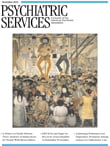Recovery Knowledge and Recovery-Oriented Services in Hong Kong
To the Editor: In the past decade, recovery has been a guiding principle in mental health care in the United States and other Western countries. The recovery model goes beyond relapse prevention and medication management to emphasize the importance of living a meaningful life and achieving one's potential (
1 ). In Hong Kong recovery is a relatively new model, compared with the traditional psychiatric rehabilitation and medical models. Adoption of a recovery orientation requires system transformation, staff training, and reorganization of services (
2 ). A staff survey was conducted at the New Life Psychiatric Rehabilitation Association, the largest nongovernmental organization serving mental health consumers in Hong Kong. The survey evaluated recovery knowledge and perceptions of recovery-oriented practices.
The anonymous survey was distributed to all staff who had direct contact with consumers from April to May 2009. A total of 660 staff returned the survey (94% response rate), and 644 returned surveys had complete data for analysis. The sample included 261 males (41%). The mean±SD age was 40.58±10.15 years, and respondents had worked for the association for a mean of 6.82±5.98 years. Most (N=400, 62%) were frontline staff (hostel managers and workshop instructors), 99 (15%) were professional staff (social workers and nurses), 66 (10%) were supporting staff (office workers), and 34 (5%) were managers (officers in charge and service supervisors). The remaining staff (N=45) did not report their job rank.
The survey included the Recovery Knowledge Inventory (
3 ). Possible scores range from 1 to 5, with higher scores indicating greater knowledge. Among the 644 staff, the mean score was 3.53±.26 on roles of self-definition and peers in recovery, 3.36±.98 on roles and responsibilities in recovery, 2.53±.59 on nonlinearity of the recovery process, and 2.67±.62 on expectations regarding recovery. Professional staff and managers had higher scores than frontline and supporting staff on roles and responsibilities, nonlinearity, and expectations (p<.01). Professional staff had the highest scores of all staff on roles of self-definition and peers (p<.05). Gender and working experience were not related to scores; however, older staff tended to have poorer understanding of recovery concepts (range of r=-.13 to -.26, p<.01).
The Recovery Self-Assessment-Revised (
4 ), which assesses perceptions of the implementation of recovery principles, is scored similarly. Respondents' ratings in three areas—treatment options (3.84±.55), choices (3.76±.50), and life goals of consumers (3.84±.47)—were significantly lower than their ratings of individualized care (4.00±.51) and inviting environment for consumers (4.09±.55). Professional staff had higher ratings than frontline staff for inviting environment (p<.01). Among demographic characteristics, age was weakly associated with inviting environment (r=.15) and individualized care (r=.11), and working experience was related to inviting environment (r=.08) (p<.05).
Findings showed a need for staff training on recovery and improvement of recovery-oriented services. In particular, nonlinearity and consumer choice should be emphasized. Using a mix of experiential and didactic approaches, training should attempt to address myths and concerns and should be tailored for various types of staff on the basis of their knowledge and service provision needs. Consumers and family members should be involved in training and in the transformation process. Training for all stakeholders is essential to ensure that mental health care is recovery oriented.

